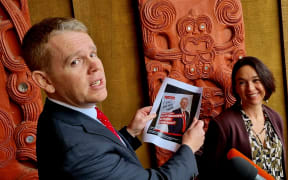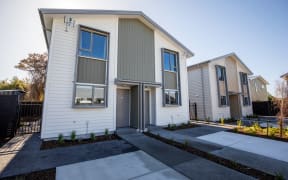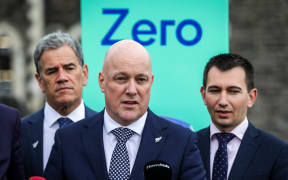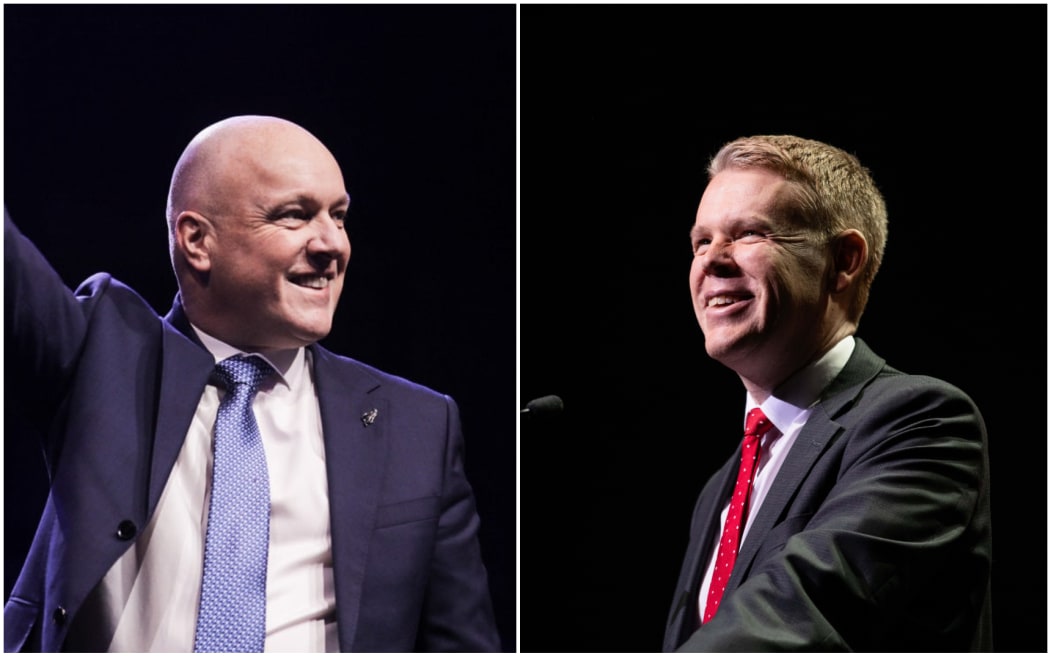
Christopher Luxon and Chris Hipkins on the campaign trail. Photo: RNZ / Samuel Rillstone
Analysis - The main parties launch their campaigns and Labour's attack ads draw an angry response, National's tax cuts are challenged, the policy deluge continues and is this "the most negative campaign in New Zealand history?"
Labour and National launched their campaigns and there was a marked difference in style.
Chris Hipkins came out with a big policy - free dental care for people up to age 30 - while National's Christopher Luxon revealed a pledge card setting out his party's priorities in government.
Luxon's policy-free launch was overshadowed by a controversy over whether National could actually implement one of the main schemes it plans to use to fund its tax cuts. (More about that later - it has important implications.)
Labour's launch was a folksy affair, reported to be energetic and lively, while National's was seen as a slick, made-for-television production.
The Herald's political editor Claire Trevett was at both of them and reported: "National walked out of there thinking they could win, but clearly wary it could slip away. Labour walked out of theirs thinking they might be able to win, after all."
She said Luxon's aim had been not to offer up treats for voters, but rather to convince them he was primed and ready to become prime minister, while Hipkins had to show his supporters he was not tired, he was not giving up and would not make it easy for National.
Trevett thought both leaders could head out on the campaign trail knowing they had done their job.
However, Luxon's good day only lasted until the post-launch press conference.
He found himself surrounded by reporters wanting to know whether National's proposal to tax foreign home buyers was actually possible.
This was to become the issue of the week, and for good reason.
To fund its $14.6 billion of tax cuts, National proposes a set of measures including partially lifting the ban on foreign home buyers and taxing them 15 percent on houses over $2 million.
The tax on foreign house sales is the biggest revenue-earner in the policy; the party says it would raise $2.9bn over four years.
National checked out New Zealand's free trade agreements to make sure the foreign buyer tax did not cut across them. But it does not appear to have thought about bilateral tax agreements with countries like China which mean its nationals cannot be taxed more than New Zealanders.
New Zealand Herald senior political correspondent Audrey Young was onto this, pointing out in an interview with Q and A's Jack Tame that National's finance spokesperson Nicola Willis had said the party talked to people "subsequently" about the tax treaties.
"That suggests National overlooked the possibility it might breach the rules of New Zealand's bilateral tax agreements until it was too late," Young said.
"That gives it a very strong incentive to say it doesn't, even if it does - and National is saying with the utmost confidence that it doesn't."
Young said the issue was leading to an important dispute that stretched the credibility of the policy and perhaps ultimately to National's claims to be better economic managers.
"The trouble for Luxon and Willis is that while National is not willing to release its own advice on the policy, tax experts and economists are openly casting doubt on it," she said.
There is a thorough analysis of this on RNZ's website.
"Tax experts and economists believe National's revenue projections are 'optimistic' and have raised concerns on what it could do to New Zealand's international reputation," the report said.
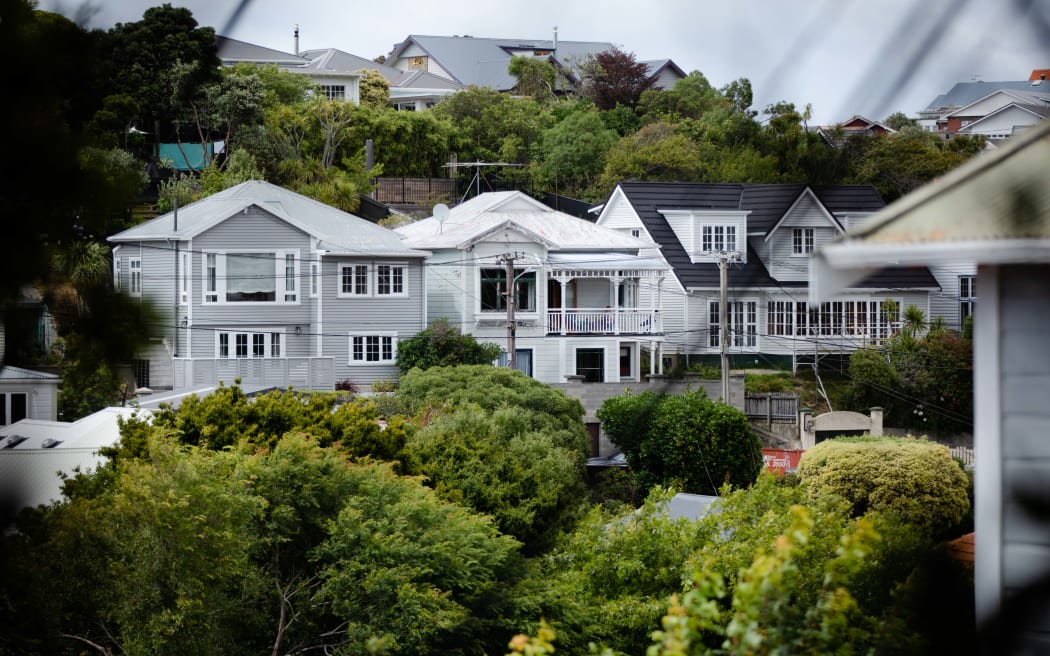
Foreign buyers of luxury homes worth over $2m would be taxed under National. Photo: RNZ / Angus Dreaver
Foreign sales hard to swallow
Aside from potential problem with the purchase tax, there are doubts about whether foreigners are going to buy enough expensive houses to raise the revenue National expects.
"To bank its forecast $740 million annually from the mansions tax, National needs about 2000 of the estimated 50,000 houses in that bracket to be sold to overseas buyers every year," said Stuff columnist Vernon Small, a former senior adviser to David Parker when Parker held the revenue portfolio.
"That is more than $5 billion of New Zealand real estate going into overseas ownership every year. Sales of that magnitude will be hard for voters to swallow, although Christopher Luxon and Nicola Willis clearly believe the tax income will sugar the pill," Small said.
"More to the point, the sales assumption is beyond heroic. Based on pre-foreign-buyers-ban numbers, CoreLogic's Nick Goodall has estimated the tax could raise as little as $50 million a year, leaving National roughly $700 million shy of the revenue it has budgeted for."
The one thing that National has going for it is that none of this, either the tax on foreign buyers or how many houses they buy, will be tested until the policy is in place.
Until then Luxon and Willis can continue to say there are no problems, and after the election it will not matter much. If National and ACT form the next government and the policy starts falling apart, all the critics will be able to say is "we told you so".
Here is how Newshub journalist Patrick Gower saw it playing out.
National would "bluff and bluster their way through their jiggery pokery and hope that Kiwis don't understand it or don't care," he said on the AM Show.
"I'll tell you what their tactic is. It's 'keep going… we'll just say we're going to do it and we reckon we will just get through'."
Also on National's side is the complexity of the issue. "The dispute is being fought in a hotly contested area that only a handful of people can claim to fully understand," said Herald deputy political editor Thomas Coughlan.
"It is complicated stuff. Many people contacted for this story politely declined to give their views on the issue, citing the niche complexity of international trade and tax agreements."
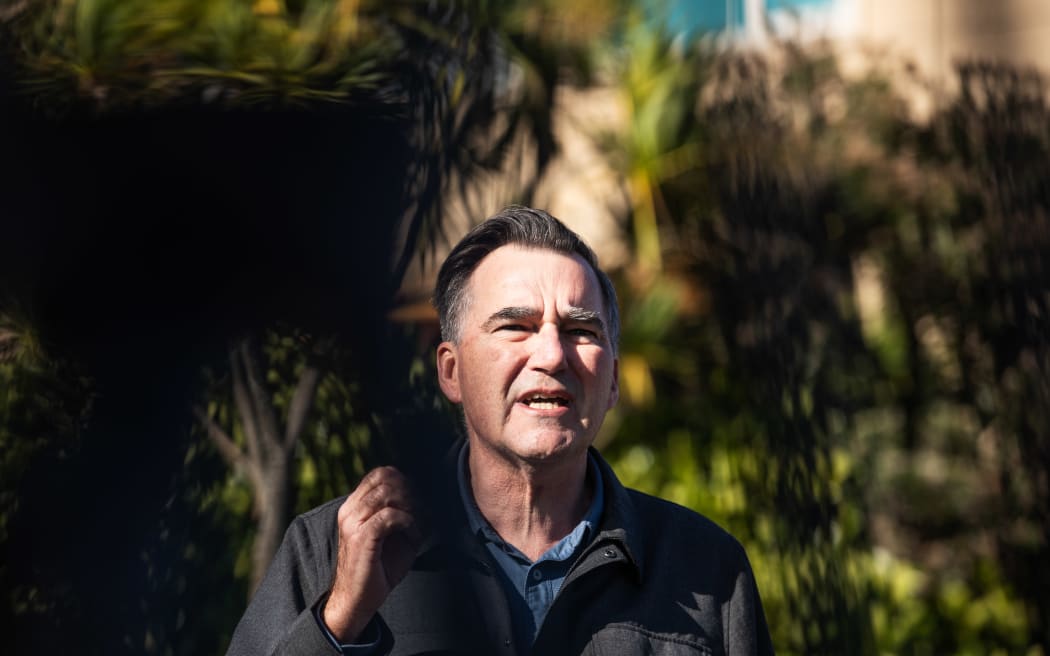
CTU president Richard Wagstaff. Photo: RNZ / Samuel Rillstone
Attack ads under fire
Is the election campaign really becoming "the most negative in New Zealand history"? Has it really descended into "never before seen depths"?
Those extravagant claims were made by National's campaign chair Chris Bishop after billboards started springing up this week carrying a picture of an unsmiling Luxon over the caption "out of touch… too much risk".
It also ran as a full page wraparound in the Herald on Monday with bullet points saying, among other things, that Luxon was "focused on the wealthiest few", wanted to scrap fair pay agreements and planned to give billions in tax cuts to landlords.
The Herald's Trevett said the image of Luxon had "an eerie likeness to Mussolini".
The ads and billboards were the work of the Council of Trade Unions (CTU) - Labour said it did not have anything to do with them.
That was confirmed by CTU president Richard Wagstaff.
Wagstaff said Labour was not involved at all.
"Labour are not even mentioned in the ads… we're not asking people to vote for Labour we're simply saying that Christopher Luxon and his policies would present a major danger to working New Zealanders," Wagstaff said.
Bishop did not buy that. He said the CTU was intimately connected to the Labour Party. "It's in the name, it's the Labour Party because they're part of the labour movement."
Willis told First Up the ad was nasty and personal, while Hipkins said on Morning Report National should get used to it if it wanted to be in government and Luxon wanted to be prime minister.
"You get scrutinised and criticised every day," he said.
"I have been every single day since I became prime minister - much of it from the National Party. That's just the nature of the democratic system and it's not actually unhealthy."
Labour strategists were not taking National's complaints seriously, Stuff reported, and quoted Hipkins: "They're desperately trying to distract attention away from the fact that they've been caught out with the numbers and their policies just not stacking up… they're trying to create a diversion."

National has pledged to put ebike chargers on tourist attractions like the Otago Rail Trail. Photo: 123RF
Promises, promises
There was another deluge of policies this week, and with five weeks to go even the most intensely interested voters will surely have difficulty remembering more than a few of them.
Luxon, explaining his policy-free campaign launch, said National had already released more than 40.
Among the latest were:
Hipkins promise to add another 300 frontline police and expand the use of mental health officers for callouts. He said Labour would also explore making stalking a crime, in line with Australia and the UK.
National said it would boost tourism by adding another Great Walk, putting e-bike chargers on cycle trails and reworking holiday visas.
Labour, National and the Greens each promised to build at least 1000 state houses in Auckland every year, if elected.
ACT leader David Seymour said his party would prioritise productivity over everything else, and announced the four sectors that would be the first to come under review for red-tape-cutting. They were early childhood education, the health workforce, primary industries and financial services.
Luxon promised a National-led government would deliver 10,000 electric vehicle (EV) chargers by 2030. He said New Zealand was lagging behind other countries - it had one charger per 95 EVs while in the UK there was one charger for every 20 EVs.
Labour announced the launch of a youth intervention programme. Children's Minister Kelvin Davis said the programme would help assign an intensive support social worker for up to 60 recidivist young offenders and their families.
National said it would set up a cyclone and flood recovery ombudsman and "unblock" the EQC assessment pipeline.
Hipkins made a pitch to business, saying it would have "a seat at the table" if Labour was re-elected, and it would be the more fiscally prudent party. Citing the pandemic response, he said the government had done some things "very, very quickly" and he thought "a bit of that sense of urgency" should be applied to other challenges.
Labour released a five-point economic plan including growing an export-led economy, turning New Zealand into a sustainable agriculture and agri-tech centre of excellence, being a global leader in renewable energy, harnessing digital creativity and boosting premium tourism offerings.
He explained how the next Labour government would do that, and all the details of the latest policies are on RNZ's website.
That is probably enough promises to remember for now.
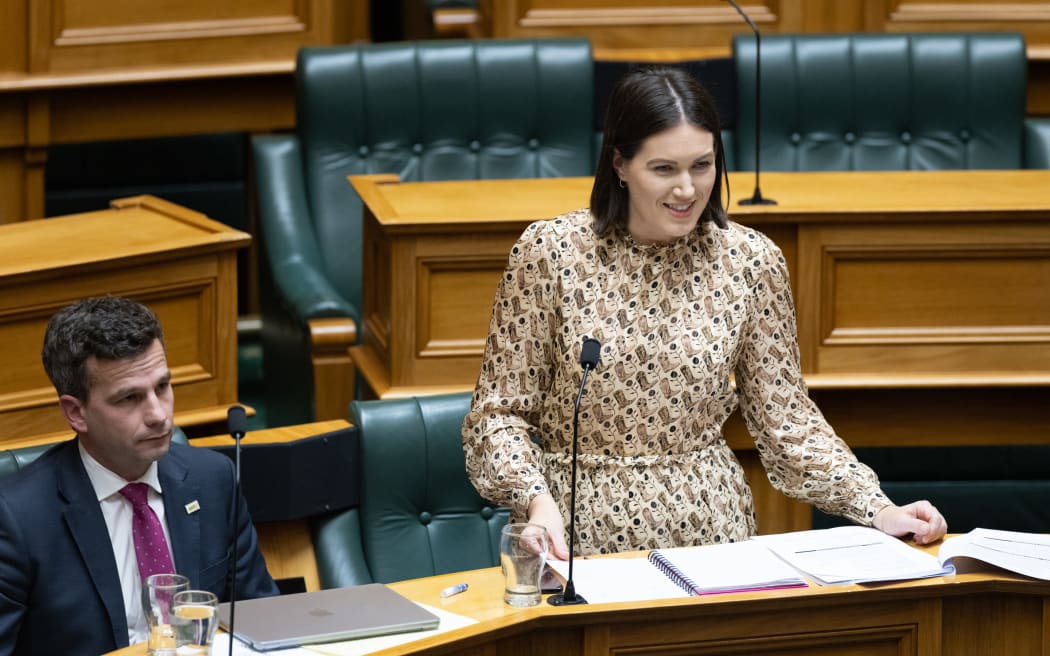
The latest Talbot Mills poll is showing ACT with 12 seats in the next government. Photo: Johnny Blades
Sorry showing for Labour
The week ended with more bad polling news for Labour.
The Herald reported on Friday that the latest Talbot Mills corporate poll showed Labour dropping to 30 percent, down from 32 percent last month.
National was on 36 percent, up one point, the Greens jumped two points to 12 percent and ACT dropped a point, falling to 10 percent.
The poll showed NZ First on 5.4 percent - which is over the threshold to get into Parliament without winning an electorate seat.
On those numbers, National would have 45 seats and ACT 12. They would need NZ First's seven seats to govern.
*Peter Wilson is a life member of Parliament's press gallery, 22 years as NZPA's political editor and seven as parliamentary bureau chief for NZ Newswire

